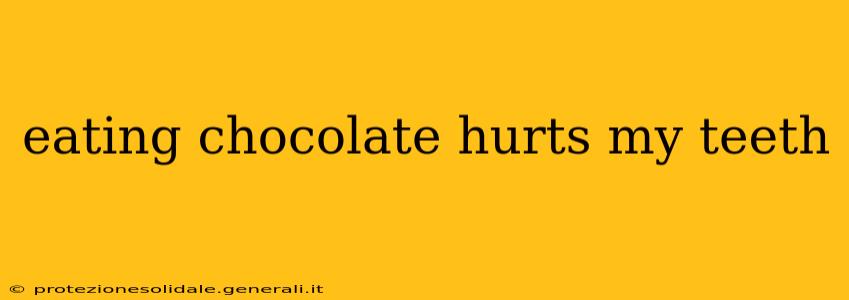Chocolate. The very word conjures images of decadent desserts, smooth beverages, and sweet treats. But for many, the enjoyment of chocolate comes with a nagging worry: does it hurt my teeth? The short answer is: it can. The extent of the damage depends on several factors, which we'll explore in detail.
What Makes Chocolate Harmful to Teeth?
The primary culprits in chocolate's potential harm to teeth are sugar and acid.
-
Sugar: Bacteria in your mouth feed on sugar, producing acids that attack tooth enamel. The more sugar you consume, the more frequently these acids are produced, increasing the risk of cavities (dental caries). Dark chocolate generally contains less sugar than milk chocolate or white chocolate, but it's still important to consume it in moderation.
-
Acid: Chocolate, especially some varieties, contains acids that can directly erode tooth enamel. This erosion weakens the teeth, making them more susceptible to cavities and other dental problems. The acidity varies depending on the type and processing of the chocolate.
How Much Chocolate is Too Much?
There's no magic number that defines "too much" chocolate. It depends on individual factors like oral hygiene practices, overall diet, and the type of chocolate consumed. However, limiting your intake and practicing good oral hygiene are crucial.
What About Dark Chocolate? Is it Better for My Teeth?
Dark chocolate often gets touted as a healthier alternative, and in some respects, it is. It typically contains less sugar and a higher concentration of cocoa, which has been linked to certain health benefits. However, it's still acidic and contains sugar, so it's not a completely risk-free indulgence.
Can I Still Eat Chocolate and Protect My Teeth?
Absolutely! Here's how:
- Consume chocolate in moderation: Limit your intake to small portions, and avoid constant snacking on chocolate throughout the day.
- Choose dark chocolate (in moderation): Opt for higher-cocoa percentage dark chocolate as it generally contains less sugar.
- Practice excellent oral hygiene: Brush your teeth twice a day with fluoride toothpaste, floss daily, and consider using a mouthwash.
- Rinse your mouth with water after eating chocolate: This helps wash away sugar and acid from your teeth.
- Visit your dentist regularly: Regular checkups and cleanings are essential for maintaining good oral health and catching potential problems early.
Does Chocolate Cause Tooth Decay?
Yes, chocolate can contribute to tooth decay, especially if consumed frequently and without proper oral hygiene. The sugars and acids in chocolate create an acidic environment in the mouth, weakening tooth enamel and making teeth more vulnerable to cavities.
How Can I Minimize the Negative Effects of Chocolate on My Teeth?
The best approach is a combination of moderation and good oral hygiene. Remember to limit your chocolate consumption, brush and floss diligently, and rinse your mouth after indulging in chocolate treats. Regular dental checkups are also crucial for monitoring your oral health and addressing any potential issues early on.
What Are the Long-Term Effects of Eating Too Much Chocolate on My Teeth?
Consuming excessive amounts of chocolate without proper oral hygiene can lead to various dental problems, including:
- Cavities: The most common consequence of excessive sugar intake.
- Tooth enamel erosion: Acidic components in chocolate can wear away the protective enamel, leaving teeth vulnerable to sensitivity and decay.
- Gum disease: Poor oral hygiene, often exacerbated by sugary foods like chocolate, can contribute to gum inflammation and periodontal disease.
By understanding the potential impact of chocolate on your teeth and taking proactive steps to mitigate the risks, you can continue to enjoy this delightful treat without compromising your oral health. Remember, moderation and good oral hygiene are key!
